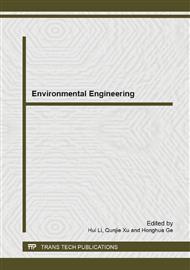[1]
Li Wenshu, Li Yongmei, Gu Guowei. Application of advanced oxidation processes in the treatment of persistent organic pollutants[J]. Industrial Water Treatment, Vol. 24 NO. 11(2004): pp.9-12.
Google Scholar
[2]
Chen xiaoyang. Degradation of typical organic pollutants in aqueous solution with advanced oxidation technology based on sulfate radicals[D]. Dalian University Of Technology. (2007).
Google Scholar
[3]
Hardwick T J. The free radical mechanism in the reactions of hydrogen peroxides[J]. Can. J. Chem. ,1957,35(3):428.
Google Scholar
[4]
Xiang Xinyi, Zheng Huaili. A Review of Fenton Oxidation used in Degradation of Dyes. Vol. 26 NO. 4 (2004): p.127.
Google Scholar
[5]
E. Neyens,J. Baeyens. A Review of Classic Fenton's Peroxidation as an Advanced Oxidation Technique[J]. Journal of Hazardous Materials, Vol. 98(2003): pp.33-50.
DOI: 10.1016/s0304-3894(02)00282-0
Google Scholar
[6]
Jiang Jinyuan,LI Yong,Wang Cuowei,etc. Treatment of Acrylic Fiber Polymerization Wastewater by Fenton Method[J]. Research of Environmental Sciences. Vol. 23(2010): pp.897-901.
Google Scholar
[7]
Zhang Hui, Huang C.P. Treatment of Landfill Leachate by Fenton Process[J]. China Water&Wastewater. Vol. 17(2001): pp.3-5.
Google Scholar
[8]
Shao Kelong, Zhou Jiti, Lv Hong, etc. Pesticide wastewater pretreatment by ozonation processes[J]. Chinese Journal of Environmental Engineering. Vol. 3(2009): p.1259.
Google Scholar
[9]
Fujishima A. ,Honda K. electrochemical photolysis of water at a semiconductor Eletrode. Nature, Vol. 37(1972):p.238~245.
Google Scholar
[10]
John.H. Carey et al. Photodechlorination of PCB in the Presence of Titanium Dioxide in Aqueous Solutions at semiconductor Powder[J].J. Phys. Chem,Vol. 81(1997):p.1484.
Google Scholar
[11]
Zhao Honghua, Wang Jiusi. Research supported TiO2 photocatalytic degradation of acid red dye[J]. Gansu Environmental Study and Monitoring. Vol. 15(2002):p.238.
Google Scholar
[12]
Sun Shangmei, Zhao Lianhua, Kang Zhenjin. The Photocatalytic Treatment of Pesticide Production Wastewater[J]. Journal of Yanbian University(Natural Science). Vol. 24(1998): p.77.
Google Scholar
[13]
Li Xiaoming, Wang ming, etc. Study on Electrolytic Oxidation for Landfill Leachate Treatment[J]. China Water&Wastewater. Vol. 17(2001): p.14.
Google Scholar
[14]
Luo Cabin, Jiang Mingyu. The research of electrolytic oxidation depth processing oil refining chemical industry waste water technology[J]. Petroleum Processing And Petrochemicals. Vol. 35(2004): p.67.
Google Scholar
[15]
Zhao Deming, Shi Huixiang, etc. Degradation of Phenol Waseewater by Dual-frequency Ultrasound Technology[J]. Journal of Chemical Industry and Engineering. Vol. 54(2003): p.570.
Google Scholar
[16]
Xu Changcheng, Gao Yuan. Study of Degradation of Charring Waste Water by TiO2 Photocatalyst[J]. Journal of Kunming University of Science and Technology(Science and Technology). Vol. 28(2003): p.1.
Google Scholar


